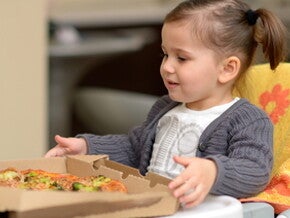
Healthy Snacks For Children
Smart Snacking For Kids
IMPORTANT NOTICE: The World Health Organization (WHO) recommends exclusive breastfeeding for the first 6 months and continued breastfeeding for as long as possible. Growing up milks are formulated to meet nutrition needs of healthy young children older than 1 year and should not be fed to infants.
Snacks play a major role in a child’s daily intake. According to World Health Organization and UNICEF, healthy snacks are a must for all children. As for toddlers between 1 and 2 years old in particular, they should be offered 3 to 4 snacks per day.
That being said, it is advised that every mother helps her child benefit the maximum of these small meals, by trying to prepare healthy snacks that are fresh and healthy right before their time to be served. Also, it is important to stay away from junk food that are full of empty calories sugar and salt, and to choose snacks from these four nutritional groups: Grains like bread, rice, potato and pasta, fruits and vegetables, dairy like milk, cheese and labneh, and protein foods, such as meat, fish, beans and eggs.
In addition, it is advised to the mother to serve her kid snacks away from the television or other activities, which enables them to focus on the meal.
Do you need some ideas to prepare healthy snacks for your child? Why don’t you try out these recipes that will make your child feel happy and healthy?
- Different types of (raw or cooked) veggies like carrots, kale, and cucumbers with a small amount of hummus or honey* mustard sauce or peanut butter as dips.
- A handful of roasted nuts rich in protein and healthy fats.
- Different types of fruits like strawberries, apples and pears with some yogurt dip.
- A Smoothie drink made of specialized growing-up milk, banana and strawberries.
- A cup of specialized growing-up milk with some whole grain breakfast cereals.
- Whole wheat Pita chips with hummus paste.
- Whole wheat muffins roasted and covered with pizza sauce and a drizzle of mozzarella cheese.
- Salted biscuits with peanut or almond butter.
- Homemade pop corn with a sprinkle of Parmesan cheese.
- Tortilla bread with a layer of cheese, a slice of turkey and lettuce.
Are you going to try these simple and delicious suggestions or you’d like to share with us recipes and ideas of your own? In either case, the most important thing is that you attempt, by all means to serve your child a wide variety of nutritious foods to promote his growth and enhance his mental and physical capacities.
Read More: Importance Of Calcium In Your Child’s Diet
Note : Honey plays a crucial role in taste development, particularly in early life, as it introduces infants to a diverse range of flavors and helps shape their palate.
However, honey can contain the bacteria that may cause infant botulism. Consequently, honey should not be introduced before 12 months of age unless the spores of Clostridium botulinum have been inactivated by adequate high-pressure and high-temperature treatment, as used by industry.
Whenever honey is used in our products, it undergoes an externally validated treatment that ensures our products are safe to consume.




















